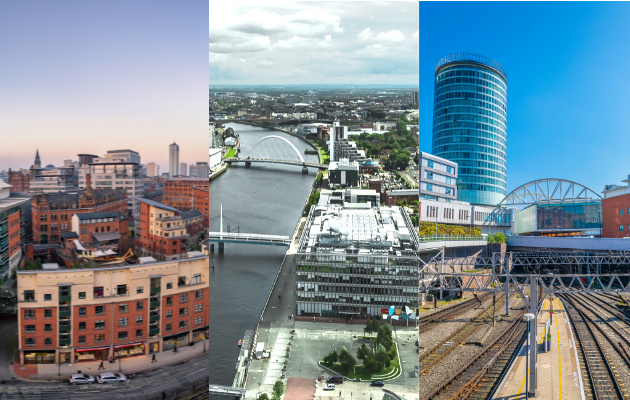
The underperformance of big cities is at the heart of the North-South divide. If the Government is to ‘level up’ the economy then it needs to tackle this major economic problem.

It is well known that British cities do not get more productive as they get bigger. But a very different picture emerges when looking at city centres with implications for levelling up.
Unlike in many other developed countries, a well remarked upon fact in urban economics in Britain is that for all the theory of agglomeration, cities here don’t become more productive as they get larger. So is agglomeration even a thing in Britain?
Digging beneath the top line stats shows that there are plenty of clues to suggest that it is. The very fact that jobs cluster in cities and large towns in Britain is a big hint – British cities account for 9 per cent of land but 59 per cent of jobs.
The clearest signs of the forces of agglomeration are seen when looking at city centres. British city centres account for just 0.1 per cent of land, but 14 per cent of jobs and 25 per cent of higher-skilled services jobs in ‘exporting’ activities. And unlike with city-wide data, this becomes more pronounced as city centres get larger. As the figure below shows, as a city centre gets bigger (measured by the number of jobs in it), the higher the share of those jobs that are in high-skilled occupations (a proxy for productivity). Agglomeration is plain to see.
Figure 1: Larger city centres have higher shares of high skilled jobs

Source: ONS, Census 2011
Note: Data for Scotland is not available. The number of jobs is on a log scale.
This occurs because of the increasing benefits that city centres offer as they get larger. Specifically it is the benefit of face-to-face interaction that dense city centre environments facilitate, which aid the sharing of tacit information and the generation of new ideas and innovations (the relationship also holds if using workers in commutable distance on the horizontal axis, to get a measure of another benefit of agglomeration – access to more workers).
Despite this relationship, this chart still suggests that Birmingham and Manchester city centres in particular are underperforming. Not only is the gap between central London and the next largest city centres very wide, but Manchester and Birmingham city centres are no larger than those in Bristol and Leeds, despite the city populations of the former being more than three times larger than the latter.
This means that, while Manchester and Birmingham city centres in their own right are very high-skilled economies and have gone through a period of rejuvenation in the last 30 years, they currently are too small (this is also likely to be the case in Glasgow, but the data isn’t available). The main focus of helping these cities achieve their productivity potential should be to enlarge their successful city centre economies.
As shown in Centre for Cities main briefing on levelling up, no government will close the North-South divide/rebalance the economy/level up the economy unless it addresses the underperformance of the UK’s big cities. Part of this will be to help support the continued rejuvenation of their city centres. Manchester and Birmingham city centres have been revitalised with the help of sustained local policy since the 1990s. The levelling up agenda should further this with the creation of a £5 billion City Centre Productivity Fund to make these and other city centres more attractive places to do business.
We should be concerned that unlike in many other countries in western Europe and the USA, cities in Britain do not become more productive as they get larger. But agglomeration is in action here as it is elsewhere. The challenge for levelling up is to work with these forces to get these centres to make a bigger contribution to both their wider regional economies and the national economy as a whole.

The underperformance of big cities is at the heart of the North-South divide. If the Government is to ‘level up’ the economy then it needs to tackle this major economic problem.

In advance of the Government’s forthcoming Levelling Up White Paper, this briefing sets out what the levelling up agenda should aim to achieve and a strategy for achieving it.

This report outlines how Mayors provide the Government with the opportunity to develop a new effective set of regional economic development policies to level up across the country and contribute to increasing the UK’s rate of economic growth.

This report sets out how the Government should use the devolution white paper to reorganise and simplify local government to level up the country.
Leave a comment
Be the first to add a comment.